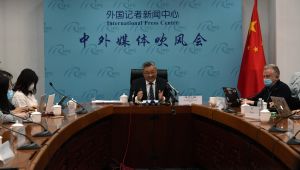International Security is America's leading peer-reviewed journal of security affairs.
International Security is America’s leading journal of security affairs. It provides sophisticated analyses of contemporary security issues and discusses their conceptual and historical foundations. The journal is edited at Harvard Kennedy School’s Belfer Center and published quarterly by the MIT Press. Questions may be directed to IS@harvard.edu
Vol. 37 No.4 Spring 2013
"How New and Assertive Is China’s New Assertiveness?"
Alastair Iain Johnston
A 2010 meme describing China’s diplomacy as “newly assertive” has spread rapidly in U.S. pundit and academic circles, but it may both underestimate the complexity of key moments in China’s recent diplomacy and overestimate the amount of change in its recent behavior. A thorough examination of seven cases of Chinese diplomacy at the heart of this meme shows that China’s behavior was more assertive in only one of the seven cases—maritime disputes. The speed and extent to which the newly assertive meme has spread suggests that online media and the blogosphere play an important and understudied role in creating conventional wisdoms that could ultimately constrain policy debates.
"First Things First: The Pressing Danger of Crisis Instability in U.S.-China Relations"
Avery Goldstein
Much has been written about the potentially disruptive impact of China if it emerges as a great power rival to the United States, but a more immediate danger—that the United States and a weaker China will find themselves locked in a crisis that could escalate to open military conflict—has not been adequately considered. An examination of the current state of U.S.-China relations compared to key aspects of U.S.-Soviet relations during the Cold War indicates that a Sino-American crisis may be more likely than is expected. Escalation pressures in such a crisis could lead to military conflict, and these pressures would likely be highest early on, compressing the time frame for diplomacy.
"Forced to Be Free? Why Foreign-Imposed Regime Change Rarely Leads to Democratization"
Alexander B. Downes and Jonathan Monten
Is military intervention effective in spreading democracy? Past studies have been inconclusive, often employing overly broad definitions of intervention, failing to account for selection, and stressing interveners’ actions while neglecting to consider preexisting conditions in target states. A statistical examination of 70 interventions during the twentieth century shows that interveners will meet with little success unless conditions in the target state are already favorable to democracy. Given that the targets for foreign-imposed regime change are usually poor, diverse states, policymakers should scale back their expectations.
"Climate Change and Insecurity: Mapping Vulnerability in Africa"
Joshua W. Busby, Todd G. Smith, Kaiba L. White, and Shawn M. Strange
Climate change is likely to exacerbate the severity and number of natural disasters in the near future, and poor and marginalized communities that lack the infrastructure and governance to prepare for and cope with such disasters will be particularly vulnerable. Given its dependence on rainfed agriculture and its low adaptive capacity, Africa is considered to be one of the most vulnerable continents to climate change. Mapping Africa’s vulnerability to extreme weather events reveals the areas that are most at risk—this information could help policymakers to adapt relief strategies and to distribute scarce resources where they are needed most, minimizing the security consequences of climate change.
-compiled by International Security staff.



